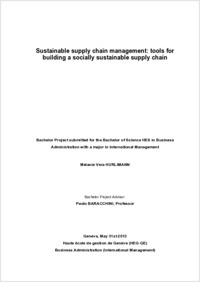Sustainable supply chain management : tools for building a socially sustainable supply chain
SONAR|HES-SO
- Hürlimann, Melanie Vera
- Baracchini, Paolo (Degree supervisor)
-
2013
74 p.
Mémoire de bachelor: Haute école de gestion de Genève, 2013
English
The factory fire and the building collapse in Bangladesh have once more put in question the business practices of internationally producing companies. The purpose of this report is to explain the tools that exist to ensure that corporate supplies are socially sustainable and how to build a socially sustainable supply chain. The focus of the research is on companies that sell internationally produced, or procured consumer goods in Switzerland. The results of the research and the recommendations are of interest for companies that plan to implement, or improve, the social sustainability of their supply chain. Due to the high exposure to the end consumer and the high level of commitment of the two biggest retailers, the Swiss consumer goods market is a forerunner in using Sustainable Supply Chain Management (SSCM) tools. Driven by the incentive of reflecting a good image to the consumer, reducing reputational risk, or out of ethical reasons, Swiss companies have implemented tools to ensure social sustainability along the entire supply chain. Being socially sustainable includes granting safe working conditions, paying living wages and avoiding child, or forced labour. This paper explains the most important tools, such as codes of conducts, labels and others, that companies in the consumer goods sector work with, to ensure that their supplies are socially sustainable. In addition, it presents the tools that international and supranational organizations have established. Companies that are deciding to implement tools, to make their supply chain more sustainable, need to define a clear strategy, taking into account the number of their suppliers, the spend with them and their purchasing power. They need to know the tools that exist in order to make supply chains more socially sustainable. It is crucial that whenever possible, companies implement tools that are used industry wide, such as becoming member of a programme, or buying from certified suppliers. The choice for the appropriate tools is highly dependent on the sector. In the clothing sector it is usual that the buyer becomes member of a programme. In the food sector the certification mainly happens at the supplier level. In any case, the buyer shall have a code of conduct in place and it shall ensure that external bodies control suppliers. Moreover, buyers shall support the suppliers to continually improve the conditions for their workers and to pass audits. This shall be done by delivering financial support and know-how, making regular visits and on-site trainings. In addition, buyers need to engage with other buyers to improve tools, share knowledge, support suppliers and if necessary boycott them. Furthermore, it is important that the buyer communicates its actions in a precise and transparent manner to its consumers.
- Language
-
- English
- Classification
- Economics
- Notes
-
- Haute école de gestion Genève
- hesso:hegge
- License
- License undefined
- Identifiers
-
- RERO DOC 209296
- RERO R007646685
- Persistent URL
- https://folia.unifr.ch/global/documents/314224
Statistics
Document views: 107
File downloads:
- _Bachelor_Thesis_Melanie_Hurlimann_Sustainable_Supply_Chain_Management.pdf: 186
